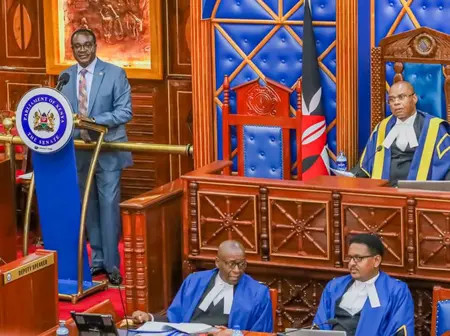The Education Cabinet Secretary (CS) Julius Ogamba has sealed the fate of over fifty thousands junior secondary school (JSS) teachers who are fighting for institution autonomy.
Ogamba says the junior school teachers will continue to work under primary school headteachers who are also doubling as principals for junior schools in acting capacity.
Speaking when he appeared before the Senate on Wednesday 1st October 2025, Ogamba says currently the junior schools are operating in line with the recommendations of the Presidential Working Party on Education Reforms (PWPER).
The PWPER had recommended merging of junior schools with primary schools to form one comprehensive school headed by one principal and two deputies.
The Teachers Service Commission (TSC) has recently directed appointment of one junior school teachers to act as deputy principal signaling adoption of the PWPER proposals.
Ogamba also said plans are underway to reform junior schools to address a series of challenges facing the new level of education, including issues of independence, staffing and the structural framework.
He told the Senate that the Ministry is committed to reviewing the junior school system in order to respond effectively to concerns raised by teachers, parents and lawmakers.
Despite his acknowledgement that government is currently operating junior schools in line with the recommendations of the PWPER, he said consultations are still ongoing.
“The process of reforming Junior Secondary to respond to any emerging concerns is in progress. At the appropriate time, Parliament will be presented with proposals for its consideration,” Mr. Ogamba explained.
Junior school teachers have been pushing for autonomy of the institution including in countrywide demonstrations held last week.
The teachers say the junior schools are badly managed by the primary school Heads of Institutions (HOIs).
The teachers want the institution to be independent with own school administrators.
This they say will not only lead to prudent use of school resources but clear way for their own career progression.
𝑇𝑒𝑎𝑐ℎ𝑒𝑟𝑠 ℎ𝑎𝑛𝑑𝑙𝑖𝑛𝑔 𝑠𝑢𝑏𝑗𝑒𝑐𝑡𝑠 𝑜𝑢𝑡𝑠𝑖𝑑𝑒 𝑠𝑝𝑒𝑐𝑖𝑎𝑙𝑖𝑠𝑎𝑡𝑖𝑜𝑛
The Cabinet Secretary also responded to a question from Senator Joe Nyutu (Murang’a), who had sought clarification on why some JSS teachers were being compelled to handle subjects outside their area of expertise.
Mr. Ogamba noted that the competency based curriculum had introduced new learning areas that did not strictly align with existing teacher specialisations.
However, he reassured Senators that steps had been taken to bridge the gaps.
“All teachers in Junior School have undergone retooling to fully equip them with the necessary pedagogical skills to handle the new curriculum. The retooling exercise covered both pedagogy and content in all learning areas,” he said.
He added that the Government had prioritised targeted recruitment and deployment of teachers in critical subjects.
“In the latest recruitment drives, teachers of sciences, mathematics and technical subjects were given priority to address the shortages in those key areas,” he explained.
𝐼𝑛𝑓𝑟𝑎𝑠𝑡𝑟𝑢𝑐𝑡𝑢𝑟𝑒 𝑔𝑎𝑝𝑠 𝑎𝑛𝑑 𝑙𝑎𝑏𝑜𝑟𝑎𝑡𝑜𝑟𝑦 𝑓𝑎𝑐𝑖𝑙𝑖𝑡𝑖𝑒𝑠
Senators also pressed the Cabinet Secretary on the state of learning facilities in JSS, particularly practical spaces such as laboratories and workshops.
Mr. Ogamba acknowledged the gaps but pointed out that significant efforts had been made to strengthen infrastructure.
He cited the construction of 23,000 classrooms across the country and directed schools lacking purpose-built laboratories to repurpose existing facilities for practical learning.
“Currently, schools without dedicated laboratories have designated rooms equipped to support practical components. We have instructed Junior Schools to use their infrastructure repair, maintenance and improvement allocation to establish laboratories. This allocation provides Ksh.4,000 per learner annually,” the CS stated.

Leave a Reply